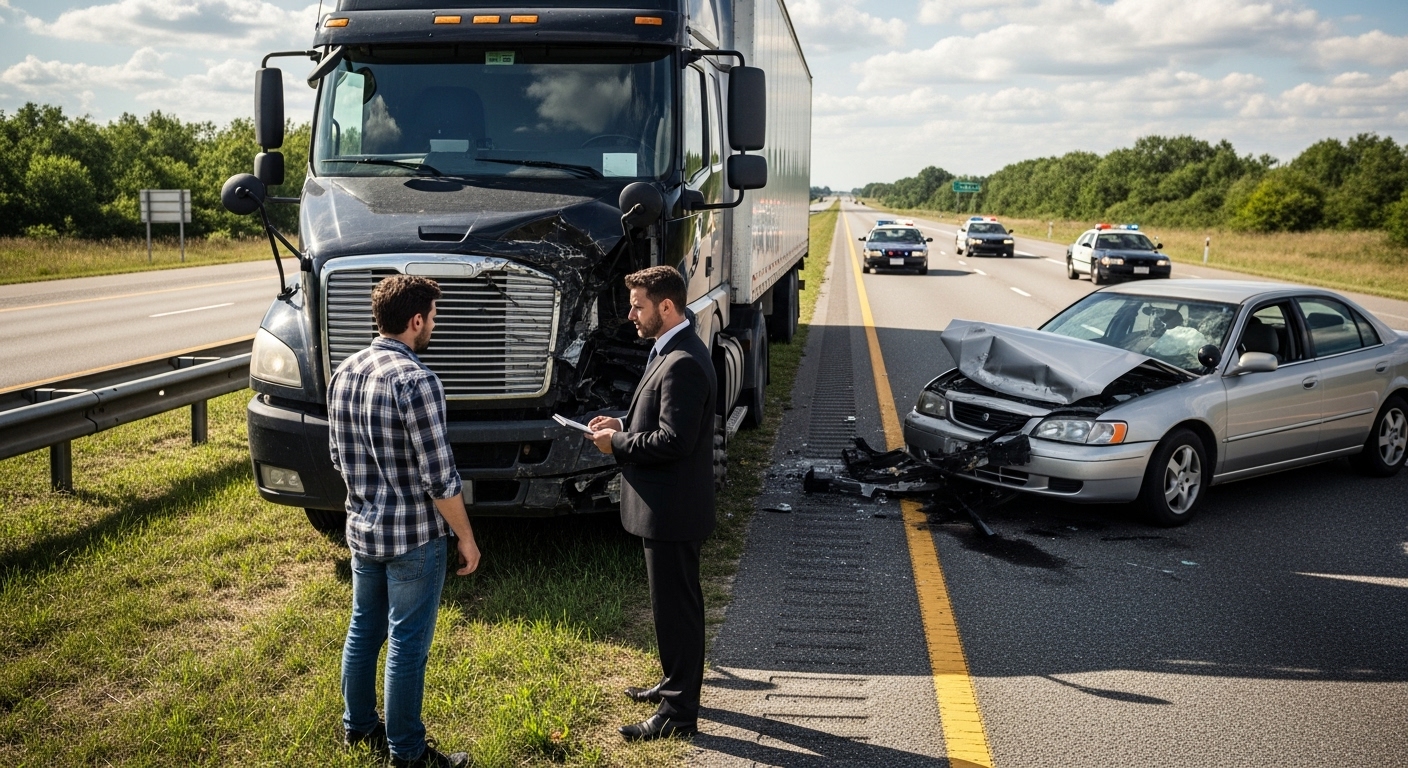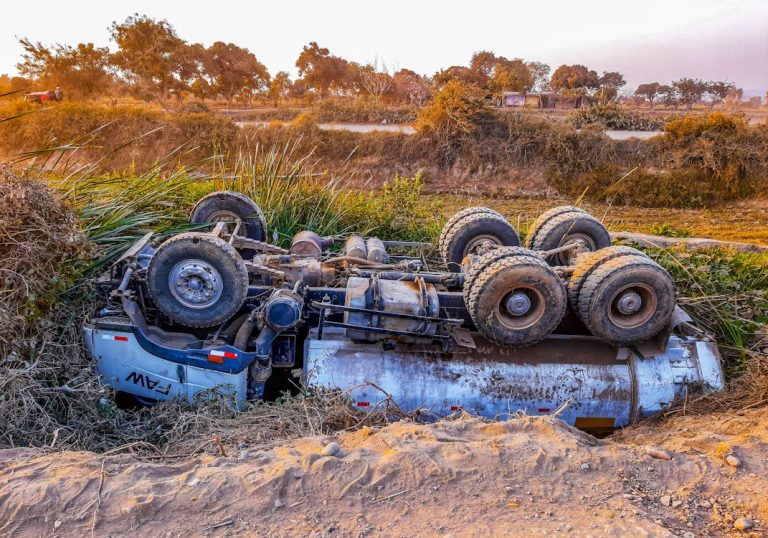A truck accident can disrupt life instantly and create overwhelming confusion during the first critical moments. The shock of impact often makes rational decisions difficult. Many victims struggle to prioritize safety and take the correct steps after the collision. Clear thinking becomes essential not only for protecting health but also for safeguarding legal rights.
Truck accidents also involve high numbers of fatalities, which makes these incidents even more devastating for victims and families. In 2023, large truck crashes caused 4,354 deaths across the country. Only 16% of those who died were truck occupants, while 65% were people in passenger vehicles. The remaining 17% were pedestrians, bicyclists, or motorcyclists.
These figures highlight the urgent need for informed action after a crash. Taking structured steps preserves evidence, strengthens injury claims, and ensures your legal rights are protected. Guidance from professionals prevents mistakes that could weaken recovery opportunities. In this article, we will guide you through the immediate actions that secure both your safety and your legal rights following a truck accident.
Prioritize Safety and Call Emergency Services
Staying calm is the first essential step after a truck accident. First, assess your own condition and see whether anyone else is hurt. Then relocate to a secure spot away from danger. Activate your hazard lights so other drivers can clearly see the situation and slow down. Do not leave the scene unless emergency personnel instruct you to.
Call 911 immediately. Emergency responders evaluate injuries and secure the crash area. Medical professionals also document trauma that becomes critical in legal claims later. Ask for a written police report at the scene. It helps establish facts such as road conditions, witness details, and the truck driver’s statements. This report becomes crucial evidence while pursuing compensation.
Understanding the causes and severity patterns of truck accidents reinforces the need for fast action and professional response. A recent study in MDPI found that heavy truck accident severity changes based on different road environments. Urban crashes are strongly affected by lighting, driver age, vehicle control, and safety features.
Highway collisions are influenced by visibility, roadside protection, and intersection design. Expressway accidents are shaped by driver violations, road alignment, and the type of impact between vehicles. These differences show why quick emergency response and situational awareness are essential for reducing harm and protecting lives.
Understand Your Legal Rights
Understanding your legal rights as early as possible is crucial after a truck accident. Victims often face confusing procedures, complex liability rules, and pressure from insurance companies to settle quickly. Multiple parties, such as trucking companies, insurers, and equipment providers, may be involved, which increases the difficulty of determining responsibility.
Trying to navigate these legal challenges alone can lead to mistakes, missed deadlines, or acceptance of unfair settlements. For this reason, they can collaborate with an experienced attorney who will help them file commercial truck accident lawsuits. Skilled legal counsel understands complex liability laws, manages critical evidence, and builds a strong case supported by accurate documentation.
Such legal support becomes even more important in states with higher truck fatalities. California consistently ranks among the top states for truck-related fatalities. As per National Safety Council data, California recorded about 392 deaths from large truck crashes in 2023. This places the state second only to Texas for deadly truck collisions.
As attorney Tim Mazzela explains, truck accident cases are far more complex than standard auto collisions. Multiple parties may share liability, strict federal and state regulations apply, and insurers often resist full compensation. These cases also require detailed evidence and reconstruction.
Collect Strong Evidence and Document Every Detail
Strong evidence forms the foundation of a winning truck accident case. Record every detail you can recall as soon as possible while it is still fresh in your mind. Note the weather, speed, road signals, and the direction of travel. Small details make a major difference during investigations.
According to Nolo, preserving evidence after an accident is essential to building a strong personal injury claim. Key evidence includes witness statements, photos and videos of the scene and injuries, medical records, employment records, and personal journals documenting pain and recovery.
Police reports and physical evidence, such as damaged property or defective equipment, can also support claims by showing how the incident occurred and the extent of harm. When evidence is collected early and handled properly, it helps negotiate fair compensation and provides a solid foundation for trial preparation.
Because injury claims can be complex and require specific proof, an experienced personal injury lawyer can help identify important evidence and ensure it is preserved properly. Even if victims plan to handle a claim themselves, consulting a skilled attorney can protect their rights and improve potential compensation.
Avoid Common Mistakes After a Truck Accident
Many victims unintentionally undermine their legal claims because they are unfamiliar with the post-accident process. Panic or emotional reactions can lead to decisions that weaken both legal and financial recovery. Understanding potential legal pitfalls is essential for safeguarding rights and ensuring fair compensation.
Never admit fault or express regret at the scene. Statements of apology or responsibility, even if unintentional, can be used against you in legal proceedings. Determinations of fault are made after a full investigation, not during moments of stress or confusion. Limit your communication to verified facts until all details are confirmed.
Exercise caution with social media following the accident. Insurance companies and opposing parties often monitor posts for content that could diminish claims. Avoid sharing information about injuries, treatments, or accident circumstances until your legal case is fully resolved. Maintaining careful communication preserves credibility and strengthens your legal position.
FAQs
1. How long do truck accident claims usually take to resolve?
Truck accident claims vary widely depending on evidence, insurance cooperation, and the seriousness of injuries. Some claims reach a resolution within a short period of time. However, complex cases may move to court and take additional time. Complex cases involving multiple responsible parties may extend timelines. A lawyer helps manage deadlines and protects your rights throughout the process.
2. Can I still file a claim if I was partially at fault for the accident?
Yes, many states use comparative fault rules, meaning compensation is still possible even when victims share responsibility. The final settlement reflects the percentage of fault assigned. Strong evidence and expert support help reduce fault calculations and improve compensation results. Never assume you are ineligible without legal guidance.
3. What should I avoid legally after a truck accident?
Do not make informal agreements or verbal promises with the other driver or witnesses. Avoid delaying documentation of the accident scene, as fading evidence can weaken legal claims. Never ignore minor injuries, as they can later affect compensation. Taking these precautions protects your rights and strengthens any future legal case.
The steps taken immediately after a truck accident strongly influence recovery and legal outcomes. Prioritize safety, call emergency services, document the scene, and protect your rights through careful evidence collection. Seek medical support and follow treatment closely. Taking informed actions helps secure fair compensation and supports long-term stability and healing.




